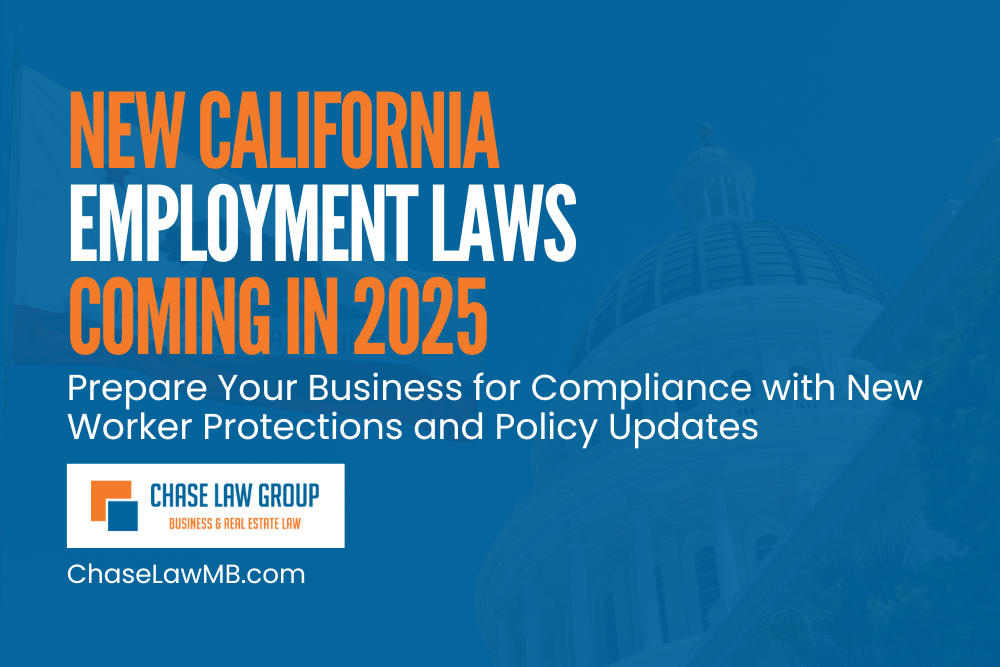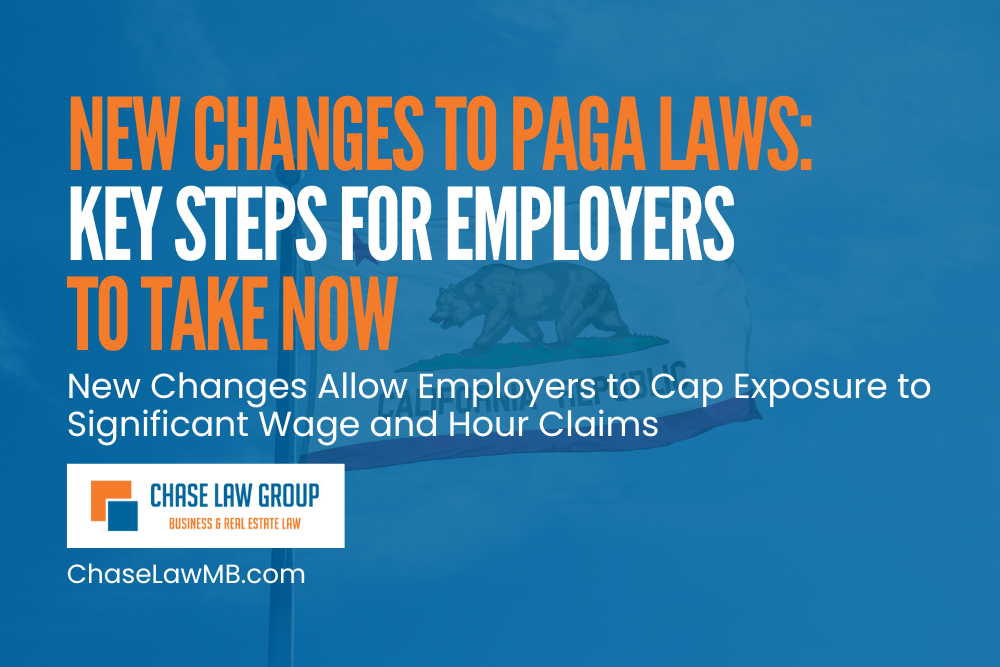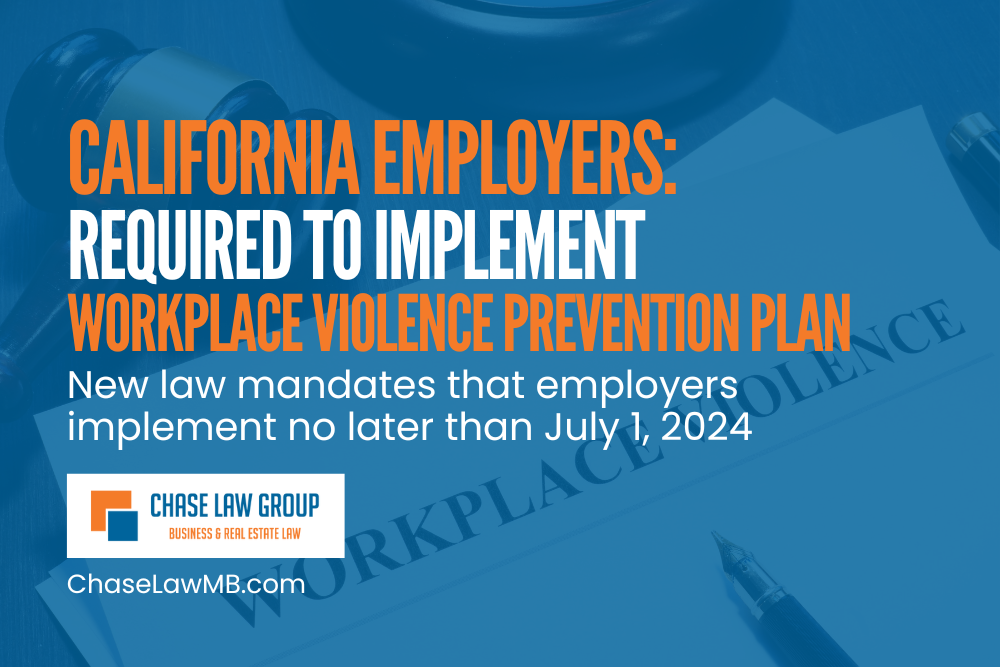
Governor Newsom recently signed into law several new California employment laws that come into effect on January 1, 2025. Below are these new laws. Prohibition of Requiring Employees to Attend a Meeting Where Religious or Political Opinions Are To Be Discussed Under SB 399, the “California Worker Freedom from Employer Intimidation Act” (subject to limited exceptions) prohibits employers from taking or threatening to take adverse action against an employee who declines to attend a meeting or participate in, receive, or listen to its opinion on “religious” or “political” matters, which includes union organizing. Violations are subject to a civil penalty... READ MORE

As the November 5th election approaches, employers are reminded to comply with California’s voting-related laws, including leave and posting requirements. Voting Leave California employers must permit employees up to two hours of paid time off to vote if they don’t have enough time outside work hours to vote. Employers may require employees to give advance notice that they will need such time off for voting. Employers can limit the time off to be taken only at the beginning or end of the employee’s shift, whichever provides the greatest opportunity for voting and minimizes the time away from the regular work... READ MORE
What Steps Should an Employer Take When an Employee Reports a Workplace Injury?
By Admin August 27, 2024 Category: Employment

When an employee reports an injury that occurred on the job, it's crucial for employers to respond promptly and correctly. Navigating this process can be complex, particularly with the overlapping requirements of your workers' compensation insurance carrier, various types of leave, and federal and state regulations. Here’s a step-by-step guide to help you handle such situations effectively. Immediate Steps to Take Ensure Employee Safety and Medical Attention: First and foremost, ensure that the employee receives appropriate medical care. If the injury is severe, seek emergency medical services immediately. If the injury is less critical, guide the employee to a healthcare... READ MORE
California’s Indoor Heat Regulations To Take Effect August 2024
By Admin July 30, 2024 Category: Employment

Starting August 1, 2024, California employers will be required to monitor indoor heat for workers and take steps to reduce the temperature in the workplace and make accommodations for employees. While this new regulation applies to virtually all companies, employers with workers in restaurants and warehouses should take particular attention to these new requirements. The new law is focused on the risk of health illness to employees.The new rule will generally require employers to cool indoor workplaces that reach or exceed 82 degrees Fahrenheit whenever employees are present. When the indoor temperature reaches 82 degrees, employers must do the following:... READ MORE
New Changes To PAGA Laws: Key Steps For Employers To Take Now
By Admin July 24, 2024 Category: Employment

After years of attempts by employer groups to repeal or make common sense changes to PAGA (Private Attorneys General Act) laws, on July 1, Governor Newsom signed Assembly Bill 2288 and Senate Bill 92 which reflect significant reforms to the Labor Code Private Attorneys General Act of 2004. The new changes to PAGA give employers a lifeline when it comes to wage and hour exposure by implementing new changes to the law that give employers the ability to avoid and reduce potential exposure under PAGA. The following sets forth the key changes in the law. 1. What is PAGA (Private... READ MORE
Important Developments in California Employment Law Effective July 1, 2024
By Admin June 27, 2024 Category: Employment

Starting July 1, 2024, California employers must comply with the following changes in the law impacting their employees: 1. Most Employers Must Implement a Workplace Violence Prevention Plan As previously explained in last month’s newsletter, California requires employers, with few exceptions, to implement a Workplace Violence Prevention Plan (WVPP) by July 1, 2024. Details of the WVPP and how to comply with the new requirements can be reviewed by clicking here. Should your company need assistance in creating a WVPP, Chase Law Group can assist you. Contact us to get started. 2. Changes in the Division of Workers Compensation New... READ MORE
It’s Time for Summer Vacation: Be Prepared for Employee Requests for Time Off
By Admin May 29, 2024 Category: Employment

With summer fast approaching, it’s a good time to review and update company vacation and personal time off (PTO) policies to ensure compliance with California law. The following is a brief discussion of the laws that apply to vacation and PTO in California. Vacation versus PTO Policy As a preliminary matter, employers are not required to have a vacation or PTO policy. However, once they do have such a policy, employers must comply with applicable California requirements. There are two approaches when it comes to providing paid time off to employees. Some employers elect to provide a stand-alone vacation policy... READ MORE
Non-Disclosure Agreements: Protecting Your Company’s Trade Secrets and Confidential Information
By Admin April 29, 2024 Category: Employment

Virtually every company has developed product details, such as recipes or processes of manufacturing, or even customer purchasing information that it wants to protect from disclosure to competitors and the public. To protect this critical data, which would be considered trade secrets or confidential information, depending on the nature of the information, companies must take key steps to ensure it is not taken by employees whether intentionally or inadvertently. A Non-Disclosure Agreement (NDA) also referred to as a Confidential Information and Inventions Agreement, is an effective and necessary tool which both notifies employees of what the company considers its trade... READ MORE
Get Prepared: California Employers Required to Implement Workplace Violence Prevention Plan by July 1, 2024
By Admin March 28, 2024 Category: Employment

Last year California passed SB 553, which is now Labor Code Section 6410.9, a first in the nation law requiring employers to implement a Workplace Violence Prevention Plan (“WVPP”). The new law mandates that employers create and implement a WVPP no later than July 1, 2024. The WVPP must comply with key requirements of the new law, which will be enforced by Cal/OSHA, who may issue citations and penalties for violations. Section 6401.9 applies to all California employers, with the following exceptions: Employers who are already covered by the Workplace Violence Prevention in Healthcare standard (or employers that already comply... READ MORE
California Job Interviews: Be Careful What You Ask For
By Admin February 26, 2024 Category: Employment

When employers interview job candidates, they appropriately focus on questions that will obtain information they need to hire the right person. However, they must also be sure that they do not ask questions that are prohibited under California law and that can potentially lead to lawsuits including those for discrimination. California employers with five or more employees are covered by the California Fair Employment & Housing Act (FEHA) which prohibits discrimination based upon age, ancestry, color marital status, medical condition, national origin, physical disability, religion, sex or sexual orientation, and military status. (Employers with fewer than five employees should also... READ MORE

